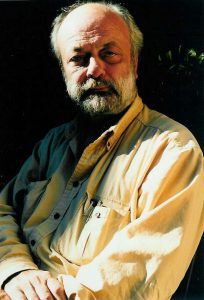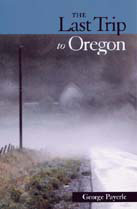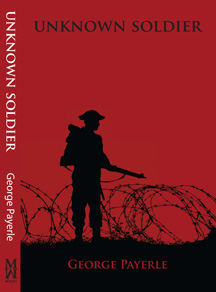January 21st 2011
 George Payerle is a Canadian poet, fiction writer and translator of Hungarian origin whose work we have wanted to add to the literary voices on our website for some time. Through a happy coincidence we connected with George through the good offices of John Miska, our BC contributor and editorial board member. As a result, we are pleased to present a thumbnail sketch of George in his own words – and through one of his poems recently dedicated to John Miska (though as he adds in his e-mail, it was “written around 1970 in a beautiful Edwardian-era bachelor flat I had near Kits Beach in Vancouver”). We will soon add a selection from one of George’s novels, Unknown Soldier (1987 and 2010). His other publications include the afterpeople (1970), Wolfbane Fane (1977), and two books of poetry: The Last Trip to Oregon (2002) and alterations (2004).
George Payerle is a Canadian poet, fiction writer and translator of Hungarian origin whose work we have wanted to add to the literary voices on our website for some time. Through a happy coincidence we connected with George through the good offices of John Miska, our BC contributor and editorial board member. As a result, we are pleased to present a thumbnail sketch of George in his own words – and through one of his poems recently dedicated to John Miska (though as he adds in his e-mail, it was “written around 1970 in a beautiful Edwardian-era bachelor flat I had near Kits Beach in Vancouver”). We will soon add a selection from one of George’s novels, Unknown Soldier (1987 and 2010). His other publications include the afterpeople (1970), Wolfbane Fane (1977), and two books of poetry: The Last Trip to Oregon (2002) and alterations (2004).
George Payerle in his own words
January 2011
My father was born in Budapest. My mother, in Zirc. They met in Winnipeg after their families had emigrated there from Hungary in the 1920s. As part of my Grandfather Payerle’s extended family, they dirt-farmed their way across the Prairies, saving enough to establish a successful dairy farm outside Armstrong, BC, where my brother, Cornell, spent his childhood. I was born in Vancouver in 1945, twelve days after Nagasaki. By then, my father was pulling green chain at a saw mill on the Fraser River; the family farm had disbanded because all three sons had married and the kitchen became too crowded.
 My first language was Magyar, because that’s what my parents spoke at home. Thus, I grew up as a Displaced Person in my native land, with a cultural background that included farming, the lumber industry, and the literature and music of both Hungary and Canada. It took me until the fourth grade in school to master English, but I had all the makings of a writer and I think I unconsciously set out to beat my English-speaking confrères at their own game.
My first language was Magyar, because that’s what my parents spoke at home. Thus, I grew up as a Displaced Person in my native land, with a cultural background that included farming, the lumber industry, and the literature and music of both Hungary and Canada. It took me until the fourth grade in school to master English, but I had all the makings of a writer and I think I unconsciously set out to beat my English-speaking confrères at their own game.
My dear friend John Miska has asked me to explain what I mean when I say that I believe my writing style in English is influenced by the Magyar I learned as my native tongue. This is difficult to do, since I never did formally learn Hungarian or Hungarian grammar. But what happens when I write, especially prose fiction, is that language floats up from my subconscious, where the “imagining” takes place, like a conscious dream. I believe that to be my ur-language, primordially Magyar in sensibility and syntax before it becomes words, which are English. Very occasionally, English doesn’t provide a word and I have to “translate” the Magyar that I hear instead.
My translation from Magyar text written by someone else is very slow and painstaking. I prefer to have a literal translation at hand, and make heavy use of both my Országh dictionary and consultation with the author (if possible). But what happens when I’m actually imagining the English version of the Hungarian text is a very similar process. I have been paid the great compliment that my translations read like Magyar, except with English words.
 I don’t know that this answers John’s question, but it should indicate why I think he’s right when he says that, like John Marlyn and other displaced Hungarians in this country, I write about Canadian characters on the periphery of their own society. This is clearly true of the characters in my first novel – the afterpeople – and Sam Collister, the Unknown Soldier. They are persons displaced by perceptions and experience which make them culturally alien in their own land. In recent years, I have been working on the rest of Collister’s life. Sam lives a lot longer than I thought he would, and succeeds in gathering his divided family around him, essentially by force of his indomitable personality. The novel should be finished this year, and might even have a publisher in the little MW Books of Garden Bay, who published the first paperback edition of Soldier late in 2010. We outsiders do eventually get into print!
I don’t know that this answers John’s question, but it should indicate why I think he’s right when he says that, like John Marlyn and other displaced Hungarians in this country, I write about Canadian characters on the periphery of their own society. This is clearly true of the characters in my first novel – the afterpeople – and Sam Collister, the Unknown Soldier. They are persons displaced by perceptions and experience which make them culturally alien in their own land. In recent years, I have been working on the rest of Collister’s life. Sam lives a lot longer than I thought he would, and succeeds in gathering his divided family around him, essentially by force of his indomitable personality. The novel should be finished this year, and might even have a publisher in the little MW Books of Garden Bay, who published the first paperback edition of Soldier late in 2010. We outsiders do eventually get into print!
Ancestral
For Miska János, cultural father
Under afternoons of Február
A silent woman in parchment
Minds her sheep.
Fevers of wolves course through her blood.
She weathers,
She becomes the weather,
A vellum page erased of its illuminations.
Nothing lessens her.
She flays her own sheep
To roast on small fires.
She dresses her hair with drippings.
She is an encirclement of animals,
Fluteless, an outcry on Carpathian hills.
Wimpled and robed in parchment,
Nunned under the sun,
Cloistered among sheep,
She summons them with her hands;
She reads nothing of what she was –
A woman wrapped in brown plains
Under the sun wherever men carry
The blood of nomads.
She traces figures of men and beasts in the dust.
She crushes her own shadow.
She gathers loose folds of light about her shoulders
And says nothing against death.
—George Payerle
